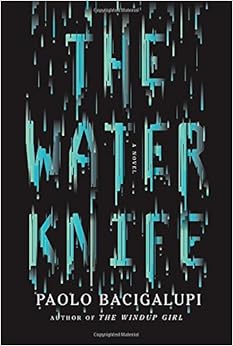
Paolo Bacigalupi is probably best-known for his Sci-Fi masterpiece "The Windup Girl," which was awarded both the Hugo and the Nebula awards when it was released in 2009. It's the kind of mindblowingly awesome writing that knocks your socks off, then dances around gleefully with them because you both know that you're never getting them back. I wasn't as impressed with his YA novels, like "The Doubt Factory," but Bacigalupi's most recent work "The Water Knife" features the same kind of intricate plots and razor's edge circumstances that earned "The Windup Girl" such acclaim.
Set in the American southwest, "The Water Knife" evokes a possible near future in which aquifers are all but dry, and the new corporate power players broker deals for water rights in the dwindling Colorado River. The richest can afford luxury apartments in Chinese-built facilities that function as their own ecosystems, with a 90% recycle rate that makes them nearly self-sufficient. But outside, the world is dying around them. With his signature usage of modern-day issues and intricate plot intersections, the author brings together three very different characters who will end by determining the fate of the dying city of Phoenix. Angel is a "water knife," an enforcer for the most famous and ruthless water baron in the southwest; Lucy is a journalist from the East Coast who moved to Phoenix for a story and "went native"; Maria is a teenage girl desperate to get out of Phoenix, hoping that her hard work and playing by the rules will earn her eventual salvation north of the Arizona border.
Part of what makes Bacigalupi's work such a compulsive read is the balance of hope and dread that he maintains throughout. The desperate settings for his best work both fascinate and horrify, because they really are potential future disasters that the Human Race may have to face. In fact much of the foundation for the situation in "The Water Knife" is based on a real book that also appears in the story, "Cadillac Desert" by Marc Reisner. The reader's investment in the outcome of the story is tied directly to the idea that this could very well be a part of our near future.
While engaging, this is not necessarily a fast-paced novel; all three characters make progress in their independent quests, but it doesn't even begin to become clear how those intersect until half-way through the book. The characters don't even all meet until the very end. Overall it's a very rewarding setup, based mainly on character development, to make your way through as a reader. It has all the apparent coincidence and "light bulb moments" of a real-life human interaction. However, this also means that it may be more of a challenging read for people who enjoy more fast-paced, mile-a-minute Sci-Fi.
Character development follows a similar gradual route for Angel, the one for whom the book is named. He begins the story as just another badass enforcer with rubber-stamped legal documents in hand, backed up by elite military forces. But he's changed by betrayal, by seeing the city and its residents up close, and by ending up on the other end of a water baron's wrath. it sounds like a stereotypical transformation, but it's the way in which Angel's character is written that makes him more than just another redeemed antagonist; it's the sheer weight of events, of what he's pushing himself to do and the disaster around him, that eventually get to him. This is represented brilliantly by the ghost who haunts him with the warning refrain that those who live by the gun will also die by it.
Lucy is a marvelous foil for Angel, hardened to stone in her convictions where he begins to question his, her ideas of what should be right and what should be wrong her only anchor in a place where the normal rules don't seem to apply. She even observes in herself that she's become one of the Phoenix residents in spirit as well as body, that she came for story and found a home for which she's compelled to fight. Maria's story is more like the opposite of Angel's, a coming of age in which she is shown extreme cruelties and faces unimaginable odds, and still tries to get herself out by following the rules in which she no longer believes. They're just what she was taught to follow. She loses literally everything: her family, her income, her home, her best friend, even her virginity in her fight to get out. And in the end, that's all she has left to live for. There seems to be nothing that Phoenix cannot take from her, and it's unclear whether she has the strength or the conviction to fight back, and how she even could.
The end of this book is absolutely perfect. As the climax resolves, Bacigalupi sets up for a traditional good-versus-evil outcome, with the old-school vision of what *should* be the right thing poised to take control. But intervention comes from possibly the least likely source in a delightful twist that sent shivers down my spine and reminded me once and for all that the world we see through the window of "The Water Knife" is not our own. Yet.
"The Water Knife" was released at the beginning of this month and can be purchased now at your favorite local, independent bookstore. I highly recommend it!
No comments:
Post a Comment